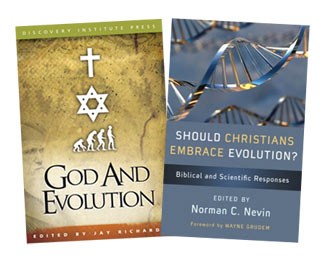 World Magazine editor-in-chief Marvin Olasky recently named two co-books of the year, both of which refute theistic evolution: Should Christians Embrace Evolution? and God and Evolution.
World Magazine editor-in-chief Marvin Olasky recently named two co-books of the year, both of which refute theistic evolution: Should Christians Embrace Evolution? and God and Evolution.
I concur with both Olasky’s and Michael Reeves’s conviction that it is essential to believing the Bible to believe that there was an actual first man Adam, and first woman Eve. Many Christians, including Christian liberal arts college and seminary professors, are claiming otherwise.
Here’s part of what Olasky wrote:
Our two books of the year have many fine chapters, but the most important one in Should Christians Embrace Evolution? is probably chapter 3, "Adam and Eve," written by Michael Reeves, theological head of Britain's Universities and Colleges Christian Fellowship.
That's because most theistic evolutionists have no room in their Darwinist theory for the special creation of Adam and Eve. They say either that Adam and Eve had "souls" inserted into their bodies while they were part of a herd of hominids, or that—as a BioLogos website article theorized—they "were not individual historical characters, but represented a larger population of first humans who bore the image of God."
And yet, as Reeves shows, "far from being a peripheral matter for fussy literalists, it is biblically and theologically necessary for Christians to believe in Adam as, first a historical person who second, fathered the entire human race." One reason such belief is essential stems from the New Testament affirmations of the early chapters of Genesis, and their centrality to our understanding of Christ's sacrifice:
In Matthew 19:4-6 and Mark 10:6, Jesus refers to the creation of Adam and Eve as if they were real historical events.
In chapter 3 of his Gospel, Luke's genealogy assigns a father to everyone except Adam, whom Luke calls "the son of God."
In Acts 17:26, speaking before a very tough crowd, the Athenian Areopagus, Paul says, "From one man He made all the nations."
In Romans 5:12-21 Paul refers to the sin of "the one man, Adam" and the sinlessness of the one man, Christ. Paul cites Adam in the same way he refers to Christ. (Pundits ridiculed Dan Quayle during the 1992 campaign when they said he spoke of the television character Murphy Brown as if she were a real person.)
In 1 Corinthians 11:8-9 Paul refers to Eve's special creation: "For man did not come from woman, but woman from man." In 1 Timothy 2:13 he does the same: "For Adam was formed first, then Eve."
In 1 Corinthians 15:22 Paul similarly treats Adam as an actual person and parallels him to Jesus: "As in Adam all die, so in Christ all will be made alive."
Reeves notes that the apostle Paul's "logic would fall apart if he was comparing a historical man (Christ) to a mythical or symbolic one (Adam). If Adam and his sin were mere symbols, then there would be no need for a historical atonement; a mythical atonement would be necessary to undo a mythical fall. With a mythical Adam, then, Christ might as well be—in fact, would do better to be—a symbol of divine forgiveness and new life."
The battle is between biblical Christianity and theological liberalism, which views Adam as mythical and Jesus as symbolic. For that reason Reeves, leaving himself open to condemnation from those who would fudge the issues, points out that debates about Adam and Eve are "inescapably foundational in that they really represent a debate between the Christian gospel and an entirely different approach to God and salvation."
Buy the books: Links to purchase the books are featured in WORLD’s 2011 Books Issue.




